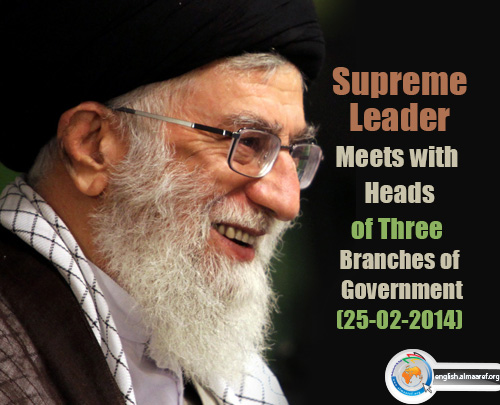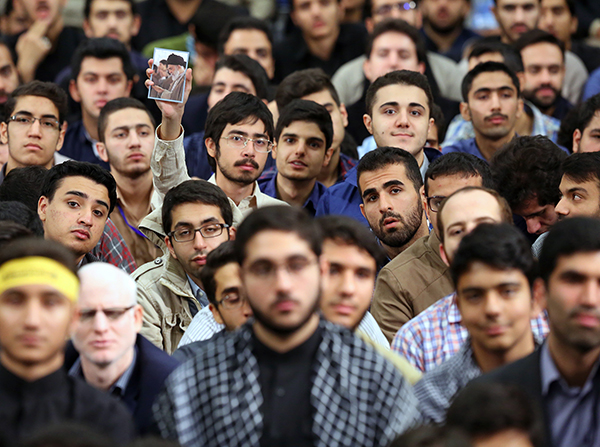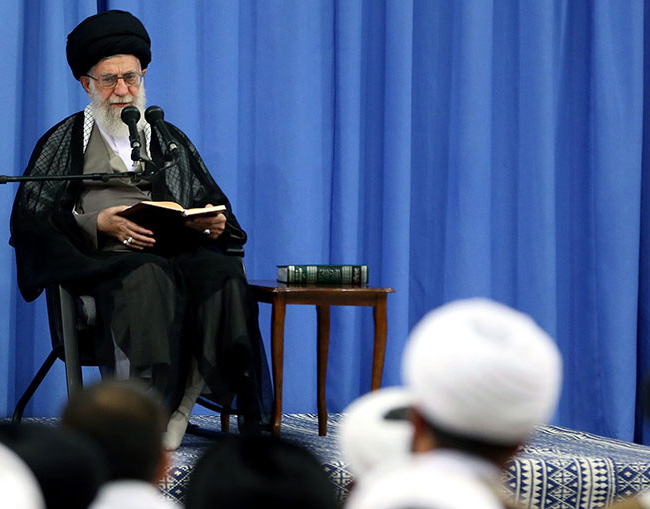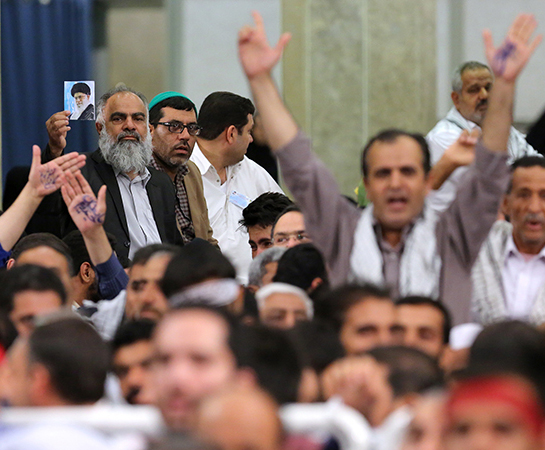Ayatollah Khamenei, the Supreme Leader of the Islamic Revolution, met on Monday
with the heads of the three branches of government. Speaking at the meeting, His
Eminence analyzed the ways for implementing policies on the economy of
resistance.
In the beginning of the meeting, the Supreme Leader of the Islamic Revolution
expressed his gratitude to the heads of the three branches of government for
trying to draw up essential guidelines for implementing policies on the economy
of resistance. He stated: "The general policies on the economy of resistance
are comprehensive policies. This comprehensibility should be observed during
implementation as well."
Ayatollah Khamenei described economic issues and economic problems as the most
important issue for the country and the people, adding: "If the general
policies on the economy of resistance are followed up and implemented in a
serious way, there will be great hope for achieving economic prosperity,
improving the economic bases of the country in the medium-term and solving part
of the problems of the people."
His Eminence stressed that the goal of holding this meeting with the heads of
the three branches of government is to find ways to implement the general
policies on the economy of resistance. He reiterated: "Now that these
policies have been announced, the people are waiting for them to be implemented.
They are waiting to see the positive results of implementing the general
policies on the economy of resistance. Therefore, the administration, the Majlis
and the judiciary branch should enter the arena in a serious way and they should
carry out and follow up their responsibilities in all areas."
The Supreme Leader of the Islamic Revolution added: "The process of
implementing the general policies on the economy of resistance should continue
non-stop until it produces the desired results. Each of the three branches
should supervise its own activities."
Ayatollah Khamenei stressed: "If implementing the general policies on the
economy of resistance requires repealing a number of contradictory laws, then
the Majlis should repeal these laws by identifying them. Moreover, if
implementing these policies requires repealing a number of problematic laws and
passing and facilitating new ones, the administration should do this by issuing
certain directives."
His Eminence said: "We should take care not to draw up the new rules and
regulations in a way that they make different laws contradict one another."
The Supreme Leader of the Islamic Revolution added: "By eliminating those
rules and regulations which oppose the general policies on the economy of
resistance and by passing new ones, the path will open for implementing these
policies in an easier way- the main part of this responsibility falling on the
shoulders of the administration."
Ayatollah Khamenei reiterated: "The responsibility of implementing and
following up the general policies on the economy of resistance should be
entrusted to those people who have revolutionary and popular motives and who
have a strong belief in implementing them."
His Eminence described cooperation between the three branches of the government
in implementing these policies as very necessary, stressing: "There should be
a very serious effort to avoid establishing new organizations in the three
branches of government and doing repetitive work."
The Supreme Leader of the Islamic Revolution stated that it is very necessary to
create a culture and a comprehensive discourse for implementing the general
policies on the economy of resistance, further adding: "The main pivots of
these policies should be announced for people in a reasonable way so that they
become well-established in different layers of society and so that they turn
into a public request."
Ayatollah Khamenei added: "Creating a discourse on the issue of the economy
of resistance and turning it into a public request solves many of the problems
and facilitates many of the tasks."
His Eminence referred to the people's participation and the ways to privatize
the economy as one of the most important pivots of the general policies on
economy of resistance, reiterating: "The country has achieved many positive
results during the past 35 years - particularly during the victory of the
Islamic Revolution and the eight-year Sacred Defense era - because of the
participation of the people."
The Supreme Leader of the Islamic Revolution stated: "By benefiting from the
people's capacities, we can carry out tasks which cannot even be carried out by
several ministries."
Ayatollah Khamenei said that the issue of importation, nutritional security and
fundamental resources is another important pivot of the general policies on the
economy of resistance. He added: "Apart from these cases, there should be an
effort to avoid importing unnecessary products."
At the end of his statements, he said: "In the present time, the ground is
prepared for implementing the general policies on the economy of resistance and
by Allah's favor, this task will be carried out in an excellent way if the three
branches and all organizations show determination and diligence."
President Rouhani said: "All executive officials really believe in these
policies. All the members of the administration are determined to implement
them. They strongly believe in these policies because the administration thinks
that implementing the general policies on the economy of resistance can
transform the economy of the country."
Pointing to the issue of nutritional security and health, which have been
specified in the general policies on the economy of resistance, President
Rouhani stated: "Nutritional security and the people's health are the two
important issues to which the administration has paid special attention from the
beginning of its term. Improving health is one of the main pivots in the second
phase of redistributing subsidies."
President Rouhani described the issue of oil, gas and petrochemicals as another
main pivot of the general policies on the economy of resistance, stressing:
"The administration is determined to increase the production of oil and gas.
Besides, developing petrochemicals is high on the agenda as well."
Mr. Larijani, the Speaker of the Majlis, said that paying special attention to
the production sector, benefiting from domestic experts, developing the private
sector and preventing unnecessary importation are among the necessary tasks for
implementing these policies. He stated: "The Majlis has passed good laws for
facilitating business. In the present time, there is not any legal problem for
investing and benefiting from the capabilities of the private sector."
Mr. Amoli Larijani, the head of the judiciary branch, referred to Article 19 of
the general policies on the economy of resistance - which highlights the
guidelines on creating a healthy environment for economy and on preventing
corruption - further reiterating: "As well as carrying out its
responsibilities towards fighting against economic corruption in a serious and
powerful way, the judiciary branch supports healthy economic activities."




















